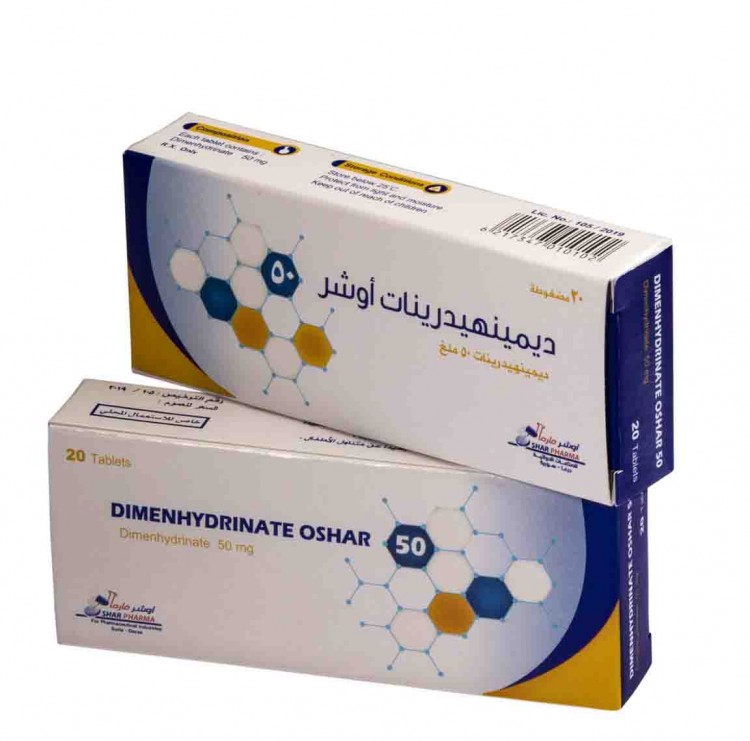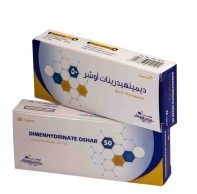Dimenhydrinate Oshar - 50 mg - tablets
For prevention and treatment of these symptoms associated with motion sickness: • Nausea • Vomiting • Dizziness Dimenhydrinate is used mainly as an anti-emetic in the prevention and treatment of motion sickness, irradiation sickness, postoperative vomiting, drug-induced nausea and vomiting, and the symptomatic treatment of nausea and vertigo due to Meniere’s disease and other labyrinthine disturbances.
Composition
Usage
Side Effects
Adverse effects with Dimenhydrinate may vary in incidence and severity from patient to patient. The most common effect is sedation which may vary from slight drowsiness to deep sleep. The drug may be associated with inability to concentrate, lassitude, dizziness, hypotension, muscular weakness and in co-ordination. When they do occur the sedative effects may diminish after a few days.
| Properties |
PHARMACOKINETICS :
Dimenhydrinate is well absorbed by the gastro-intestinal tract after oral dosing with extensive first-pass effect.
The drug is metabolised in the liver and excreted usually as metabolites in the urine.
The drug is highly bound to plasma proteins and is widely distributed in the body.
Following oral administration, the effects develop in about 30 minutes and are maximal within 2-1 hours and last for 6-3 hours.
|
|---|---|
| Dosage |
DOSAGE AND ADMINISTRATION:
to prevent motion sickness, the first dose should be taken ½ to 1 hour before starting activity to prevent or treat motion sickness.
Adults and children 12 years and over :
1 to 2 tables every 4-6 hours.
should not take more than 8 tablets in 24 hours, or as directed by a doctor.
Children 6 to under 12 years:
½ to 1 tablet every 6-8 hours.
should not give more than 3 tablets in 24 hours, or as directed by a doctor
Children 2 to under 6 years:
½ tablet every 8-6 hours.
should not give more than 1 ½ tablets in 24 hours, or as directed by a doctor.
Contraindicated for children under 2 years.
Elderly : Same as adult dose.
OVERDOSE:
- In the case of severe overdosage, the stomach should be emptied by
gastric lavage.
- Emetics should not be used.
- The patient should be kept quiet, particularly in the case of children, to
minimize the excitation which occurs.
- Convulsions may be controlled with Diazepam preferably given intravenously.
- Since Dimenhydrinate is rapidly metabolised with only traces being in
the urine, diuresis is of little, if any, value.
|
| Drug interactions |
Dimenhydrinate will interact with anticholinergic, anti-depressant (tricyclic and MAOIs) and anti-parkinsonian drugs such as Trihexyphenidyl, increasing the anticholinergic side effects, dry mouth, urine retention, confusion, etc.
The effects of Betahistine may be antagonized.
Sedating antihistamines may enhance the sedative effects of CNS depressants including alcohol, other sedating antihistamines, barbiturates, hypnotics, opiods, anxiolytic sedatives and antipsychotics.
It is important that the dose of Neperidine, Morphine or other narcotic analgesics and of barbiturates be reduced by ¼ or ½ when used concomitantly.
|
| precautions and precautions |
- Not be used for children under 2 years of age unless directed by a doctor.
Patients should advise a doctor before use if they have:
- A breathing problem such as emphysema or chronic bronchitis.
- Glaucoma.
- Trouble urinating due to an enlarged prostate gland.
Patients should advise a doctor before use if they are:
- Taking sedatives or tranquilizers.
When using this product:
- Marked drowsiness may occur.
- Alcoholic drinks should be avoided.
- Dizziness may be increased by alcohol, sedatives, and tranquilizers .
- Careful should be taken when driving a motor vehicle or operating machinery.
Dimenhydrinate should be used with caution in patients with:
- Epilepsy.
- Prostatic hypertrophy or urinary retention.
- Glaucoma.
- Hepatic diseases.
- Pyloroduodenal obstruction.
- In patients with renal impairment, a reduction in the dose of any antihistamine (e.g.dimenhydrinate) may be necessary.
- Use in children under 6 years old should only be under professional advice.
- Dimenhydrinate should not be taken with cough and cold medicines in children aged 6-2 years old.
- Children and the elderly are more susceptible to the side effects.
- It has been suggested that Dimenhydrinate could mask warning symptoms of damage caused by ototoxic drugs such as the amino-glycoside antibiotics.
- Patients with rare hereditary problems of galactose intolerance, the Lapp lactase deficiency or glucose-galactose malabsorption should not take this medicine.
PREGNANCY OR BREAS T-FEEDING:
Dimenhydrinate should not be used in pregnancy unless the physician considers it is essential.
Dimenhydrinate is excreted in breast milk to such an extent that effects on the suckling child are likely if therapeutic doses of Dimenhydrinate are administered to breast-feeding women.
Effects on ability to drive and use machines:
Patients undergoing treatment with Dimenhydrinate should not take charge of vehicles, other means of transport or machinery where loss of attention may lead to accidents because Dimenhydrinate may cause drowsiness and dulling of mental alertness.
|
| Package |
STORAGE CONDITIONS: store at room temperature (25-20)ْ C , away from moisture
PACKAGING: a carton box contains 20 tablets .
|


